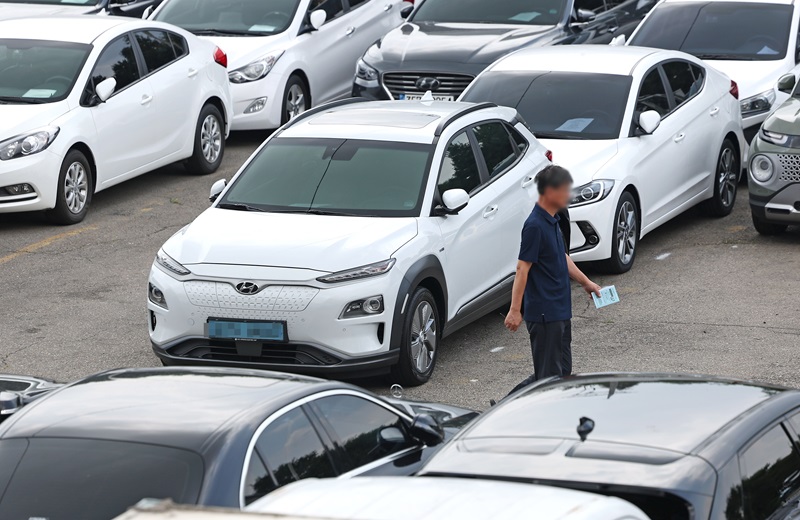EVs are piling up in the used car market — and prices are sliding — as people terrified by a recent Mercedes EV explosion in an underground parking lot earlier in the month are scrambling to sell their battery-powered vehicles.
The number of EVs seeking to be sold on secondhand car marketplace K Car surged 184 percent between Aug. 1 and 7 over the previous week. The exact number has not been disclosed.
Of them, 10 percent are Mercedes EQE sedans, the exact same model responsible for the massive blaze on Aug. 1. Not a single EQE was registered for sale the week prior.
![CCTV footage shows a Mercedes-Benz EV exploding at an underground parking lot in Incheon on Aug. 1. [YONHAP]](https://koreajoongangdaily.joins.com/data/photo/2024/08/12/9f3efb4c-488b-42c3-ab80-963d97d89695.gif)
Encar, another major used car marketplace, received requests to list 13 EQE sedans between Aug. 1 and 8, a 130 percent jump compared to the previous month.
“The number of damaged cars may rise even further as we are in the process of collecting reports from car owners,” a spokesperson for the Incheon Fire Headquarters told the Korea JoongAng Daily.
![The burnt Mercedes EQE sedan is transferred for investigation in Incheon on Thursday. The EV explosion injured 23 people and damaged around 880 vehicles in the parking garage. Some 500 households have suffered from electricity outrages for a week. [YONHAP]](https://koreajoongangdaily.joins.com/data/photo/2024/08/12/b0b12bd9-7a49-4eed-861e-0d02e3c37c95.jpg)
The financial loss resulting from the incident is reported to be around 10 billion won ($7.3 million).
The prices of used EV cars are also in free fall — regardless of brand — impacted by consumers’ disinclination for the car type.
The average price of Hyundai Motor’s Ioniq 5 dropped 2 percent on Encar in August compared to the previous month, making it the steepest fall for any Hyundai model available on the site. During the period, the price of diesel-powered Palisade SUVs rose 1.2 percent.
Tesla Model Ys saw a 3.4 percent month-on-month sink in price, while the price of Model 3s slid 2.6 percent.
Experts worry that the growing chorus of resistance may continue to drag down demand for EVs and eventually impact the country’s whole auto market.
“The fact that EV batteries can experience thermal runaway presents mass fears and it directly influences consumer sentiment,” said Lee Hang-gu, a senior analyst at the Korea Automotive Technology Institute. “Korea needs to find a suitable countermeasure to guarantee EV safety to settle current public fear.”
Through July, there were 80,613 EVs registered in Korea, down 13.4 percent on year, according to data from market tracker CarIsYou. The country was alone in the world to see a year-on-year drop in EV sales last year at 4.3 percent, while global sales rose 30 percent.
![A notice reads an EV charger is out of service in an underground parking lot in Seoul on Monday. [YONHAP]](https://koreajoongangdaily.joins.com/data/photo/2024/08/12/89de3f84-c281-466d-b7d3-4768725ac2f4.jpg)
Meanwhile, Kia on Monday disclosed that 10 of its 12 EV models are powered by batteries manufactured by local firms LG Energy Solution and SK On. The small-size Ray EVs and Niro EVs are equipped with China’s CATL batteries.
Kia’s disclosure comes a few days after Hyundai unveiled the brands of batteries in their EVs last week upon growing requests from customers.
The Ministry of Environment has launched an emergency meeting with relevant ministries to discuss possible measures such as a requirement for automakers to publicly disclose details of the installed batteries — including the brand and model names — when they launch new cars.
The government plans to have another meeting on Tuesday, organized by the Office for Government Policy Coordination under the Prime Minister’s Secretariat, to outline a new set of policies to be announced in early September.

EV fire cases totaled three in 2018 in Korea, but skyrocketed to 72 in 2023, according to the National Fire Agency. The cumulative number of EV fires over the last three years came to 139, with 68 of them occurring while driving and 36 in parked cars. The remaining 26 happened during charging.
BY SARAH CHEA [chea.sarah@joongang.co.kr]




